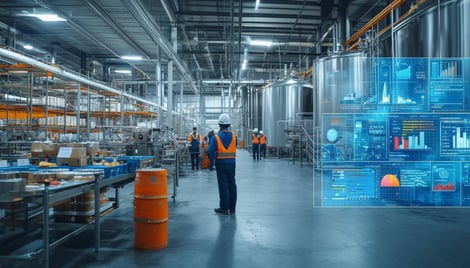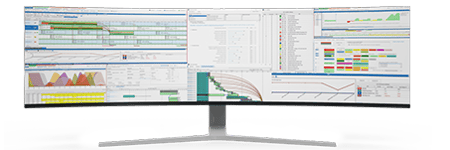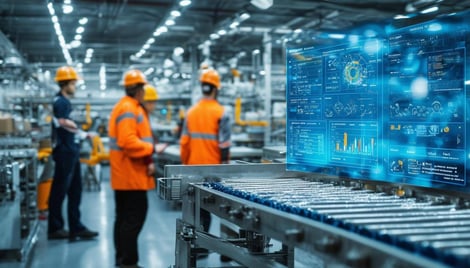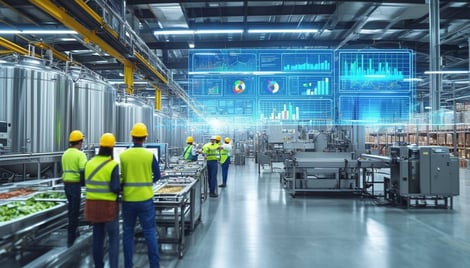Embracing Supply Chain Automation in Food and Beverage Manufacturing
From maintaining product freshness to managing inventory turnover, meeting regulatory requirements, and adapting to fluctuating consumer demand, the margin for error is razor-thin. This is where supply chain automation becomes a game-changer, enabling manufacturers to enhance efficiency, reduce costs, and improve decision-making.
A crucial aspect of successful supply chain automation lies in integrating advanced planning and scheduling tools like PlanetTogether with enterprise resource planning (ERP) systems such as SAP, Oracle, Microsoft Dynamics, Kinaxis, or Aveva. This integration ensures real-time data flow, better visibility, and a more agile supply chain.

The Case for Supply Chain Automation
Supply chain automation leverages technology to streamline and optimize processes across the value chain. Automation in the food and beverage sector has unique drivers:
- High Complexity: Managing multiple SKUs, short product shelf lives, and diverse raw materials necessitates precision.
- Regulatory Compliance: Automation ensures accurate documentation and traceability, critical for meeting stringent food safety standards.
- Demand Volatility: Real-time insights and predictive analytics help businesses adapt quickly to changing market trends.
Despite these drivers, many supply chains still rely on manual or siloed processes, leading to inefficiencies and missed opportunities. Here’s where tools like PlanetTogether, integrated with a robust ERP, come in.
![]()

PlanetTogether and ERP Integration: A Synergistic Approach
PlanetTogether’s advanced planning and scheduling (APS) capabilities are designed to enhance operational efficiency. However, its true potential is unlocked when integrated with ERP systems like SAP, Oracle, Microsoft Dynamics, Kinaxis, or Aveva. Let’s explore the key benefits of this synergy:
Real-Time Data Synchronization
Integration ensures that data from the shop floor, warehouses, and procurement teams flow seamlessly into the ERP and PlanetTogether. For example, SAP's robust database can feed real-time inventory levels into PlanetTogether, enabling more accurate production schedules and minimizing stockouts.
Improved Decision-Making
By combining ERP data on sales orders, inventory, and procurement with PlanetTogether's optimization algorithms, supply chain managers can make data-driven decisions. Kinaxis’ supply chain planning software, when integrated with PlanetTogether, can simulate scenarios and provide actionable insights for better forecasting.
Enhanced Collaboration
Integration bridges the gap between departments, enabling better communication and collaboration. For instance, Aveva’s focus on digital twin technology, when paired with PlanetTogether, can create a holistic view of the production environment, ensuring that supply chain activities align with production constraints.
Streamlined Production Planning
Microsoft Dynamics, known for its adaptability, when integrated with PlanetTogether, allows for seamless adjustments to production schedules based on real-time demand fluctuations, reducing waste and improving responsiveness.
Regulatory Compliance and Traceability
The food and beverage industry requires strict adherence to traceability standards. Oracle ERP’s comprehensive compliance tools, integrated with PlanetTogether, ensure end-to-end traceability, minimizing the risk of recalls and non-compliance penalties.

Key Automation Strategies for Supply Chain Success
To fully realize the potential of supply chain automation, it’s essential to adopt strategies that leverage the strengths of both PlanetTogether and your ERP system.
Automated Demand Forecasting
Use predictive analytics to anticipate demand changes. By integrating Kinaxis with PlanetTogether, supply chain managers can dynamically adjust production plans based on forecasted demand, ensuring optimal resource utilization.
Dynamic Inventory Management
Real-time visibility into inventory levels is crucial for preventing overstocking or understocking. Oracle’s robust inventory management module, when linked with PlanetTogether, ensures accurate replenishment planning, reducing carrying costs.
Smart Procurement
Automation in procurement can reduce lead times and ensure timely availability of raw materials. SAP’s procurement tools, when integrated with PlanetTogether, enable automated vendor selection and order placement based on production needs.
Production Scheduling Optimization
PlanetTogether’s APS excels at creating optimized schedules that account for constraints such as machine capacity and labor availability. When integrated with Microsoft Dynamics, it allows for automated adjustments to schedules in response to real-time disruptions.
Automated Reporting and Analytics
Automation should extend to reporting processes, providing actionable insights in real-time. Aveva’s analytics capabilities, paired with PlanetTogether, enable supply chain managers to monitor KPIs such as lead times, on-time delivery rates, and production efficiency.
Overcoming Barriers to Adoption
While the benefits of supply chain automation are clear, adoption is not without challenges. Common barriers include:
- Legacy Systems: Many manufacturers rely on outdated systems that are not designed for integration. Upgrading to modern ERP solutions such as Oracle or Microsoft Dynamics is a critical step.
- Change Management: Implementing automation requires a cultural shift and employee training to ensure buy-in.
- Cost Concerns: While the initial investment in automation tools and integration may be significant, the long-term ROI often justifies the expense.
To overcome these challenges, it’s essential to work with experienced implementation partners and leverage pilot projects to demonstrate value.
For supply chain managers in food and beverage manufacturing, automation is no longer a luxury but a necessity. By integrating PlanetTogether with ERP systems such as SAP, Oracle, Microsoft Dynamics, Kinaxis, or Aveva, companies can unlock new levels of efficiency, responsiveness, and competitiveness.
The road to automation may require investment and effort, but the rewards—in terms of cost savings, waste reduction, and improved decision-making—make it a journey worth undertaking. Those who embrace supply chain automation will be best positioned to thrive in a dynamic and demanding marketplace.
Are you ready to take your manufacturing operations to the next level? Contact us today to learn more about how PlanetTogether can help you achieve your goals and drive success in your industry.
Topics: PlanetTogether Software, Real-Time Data Synchronization, Integrating PlanetTogether, Improved Decision Making, Streamlined Production Planning and Scheduling, Enhanced Collaboration, Regulatory Compliance and Traceability, Food and Beverage Manufacturing





















LEAVE A COMMENT